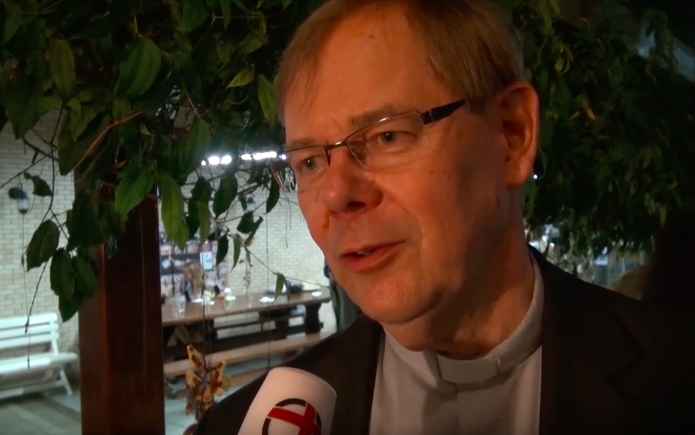German Jesuit, Key Influence on ‘Synodal Path,’ Resigns Position
As secretary of the German bishops’ conference, the Jesuit priest has shaped the direction of the German Church for the past quarter century and has been a leading figure behind its controversial current ‘synodal path.’

Jesuit Father Hans Langendörfer, one of the most influential figures in the German Church, has unexpectedly announced his resignation as head of the secretariat of the German bishops’ conference.
News of his departure on Tuesday follows the similarly unexpected decision of Cardinal Reinhard Marx, who announced Feb. 11 he was stepping down as president of the episcopal conference.
Like Cardinal Marx, the 68-year-old German Jesuit, who had served as general secretary of the bishops’ conference since 1996, said he believed it was “now a good time to hand over this office to younger hands.”
He also indicated that a layman or laywoman could be his successor, which, if it transpired, would be the “first time” in the conference’s 172-year history a non-ordained minister would hold the position, according to the German Catholic news portal, Katholisch.de.
As general secretary over the past quarter of a century, Father Langendörfer was widely viewed as the highly influential player behind most of the German hierarchy’s major decisions.
A former research assistant to the late German Chancellor Helmut Kohl, Father Langendörfer was known to be an intelligent tactician, noted for his political skills, and someone who exerted considerable control over the Church’s media apparatus.
Most recently, he has been a leading figure behind the Church in Germany’s two-year synodal path, which aims to tackle “key issues” arising from the clerical sex-abuse crisis, but which critics say threatens to undermine the Church’s teaching and possibly lead the Church in Germany into schism.
Shortly before the start of the synodal path last month, he told a German newspaper it was “unacceptable” that all issues related to the synod be decided in Rome and taken without the participation of the local Churches. He also said “no ban” would exist “on speaking about women’s ordination” during the synodal process — despite Pope St. John Paul II definitively ruling out the possibility in 1994 with his document Ordinatio Sacerdotalis.
He also reputedly had significant influence over the recent Amazon synod, which, thanks in large part to his efforts, was heavily backed by the German Church, with the broader aim of introducing women deacons and married clergy into the Church in Germany.
In 2015, Father Langendörfer was behind controversial changes to the Church in Germany’s labor law that, for the first time, allowed Church institutions to employ divorced-and-civilly “remarried” Catholics and those living in same-sex unions.
He defended the change in a 2017 interview with the Register, saying it was important to “keep the standards of labor law in Germany” and that it was “not necessary” to demand or expect the same behavior of a nurse in a Catholic hospital as a layman who serves in a parish.
In that same interview, he defended Germany’s church tax, which has been the source of much of the Catholic Church’s immense wealth in a country but which critics say has led to low Church attendance, many Catholics leaving the Church each year, and doctrinal corruption.
Father Langendörfer said it was “not up to the individual” to decide not to pay the tax because they disagreed with the Church’s decisions, adding that “if you want to exclude yourself, you exclude yourself from a proper Church membership.”
As well as general secretary, the Jesuit has also served as head of the Association of German Dioceses (VDD), a public body founded in 1968 that acts as a civil entity of the German bishops’ conference and has considerable influence over diocesan legal and economic matters.
In 2011, Father Langendörfer was faced with scandalous revelations that VDD owned Verlagsgruppe Weltbild GmbH, the largest German bookseller after Amazon, but which published pornography among its titles and had business investments in the pornography industry.
Father Lagendörfer, who was also a board member of the Weltbild group, survived the scandal after VDD staff expressed their “full confidence” in him, but VDD’s chairman, Klaus Donaubauer, resigned.
On day-to-day matters, the German Jesuit worked closely with the bishops’ spokesman, Matthias Kopp, who served as Father Langendörfer’s apprentice. The two of them have run media in the Church in Germany in a “very subtle and political way, hidden behind the scenes,” a source close to the Church in Germany told the Register. According to the source, Father Langendörfer had particular control over the German Church’s news website, Katholisch.de.
- Keywords:
- german bishops’ conference
- synodal path


















